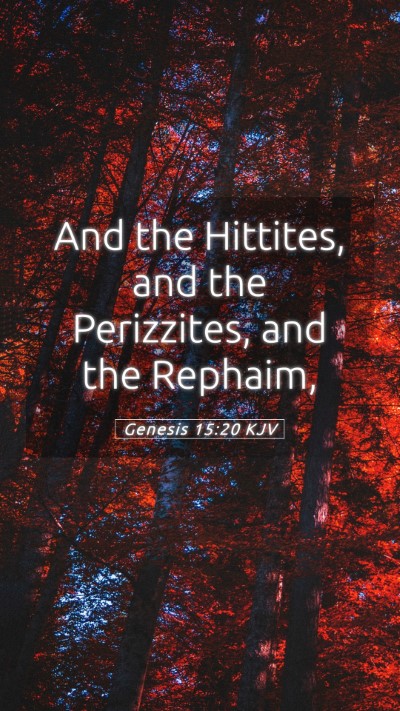Understanding Genesis 15:20
Genesis 15:20 states, "And the Hittites, and the Perizzites, and the Rephaims." This verse is part of the broader narrative where God promises Abraham numerous descendants and the land they will inherit. To deeply grasp its meaning, we turn to various public domain commentaries and insights.
Insights from Notable Commentaries
Key Themes and Applications
- The Nature of God's Promises: Genesis 15:20 is a declaration of faith—God's promises are expansive and often come with trials. Believers can find comfort knowing that God's plans transcend immediate obstacles.
- The Importance of Faith in Adversity: The lists of nations remind us that challenges will exist, but faith equips us to overcome them by relying on God’s strength.
- Historical Context: Understanding the tribes mentioned provides a crucial historical context for the Israelites’ journey as chronicled in the Old Testament.
Related Bible Cross References
- Exodus 3:8: God's promise to lead the Israelites into a land flowing with milk and honey, reinforcing the covenant made with Abraham.
- Deuteronomy 7:1: God's command to Israel concerning the nations they would encounter in the promised land.
- Joshua 1:4: The boundaries of the land promised to Israel, indicating the fulfillment of God's word to Abraham.
Conclusion
In summary, Genesis 15:20 serves as a vital passage that encapsulates God’s steadfast promise to Abraham amid challenging circumstances. Through the insights derived from various commentaries such as those from Matthew Henry, Albert Barnes, and Adam Clarke, we gain a comprehensive understanding of the implications of this verse. The mention of the Hittites, Perizzites, and Rephaims not only reflects historical entities but also reminds us of the struggles in possessing the promises of God. As readers and seekers of Biblical truth, we are encouraged to delve deeper into such passages to discover richer applications in our lives.
For Further Study
As you engage with this verse, consider forming bible study groups to explore related topics, utilize bible study tools, and reflect on the implications for personal faith and community living. Resources for online bible study are also available to help facilitate deeper understanding.



Matthew Henry's Commentary
Contextual Significance: Matthew Henry notes that this verse helps to identify the various groups residing in the land promised to Abraham. Their mention serves as a reminder of the future challenges the Israelites would face in conquering the land and living in it.
Faith and Assurance: Henry emphasizes that despite the formidable presence of these nations, God's promise to Abraham was secure. God assures Abraham that these nations will not be obstacles to His plans, reinforcing the theme of divine assurance in fulfilling His covenant.